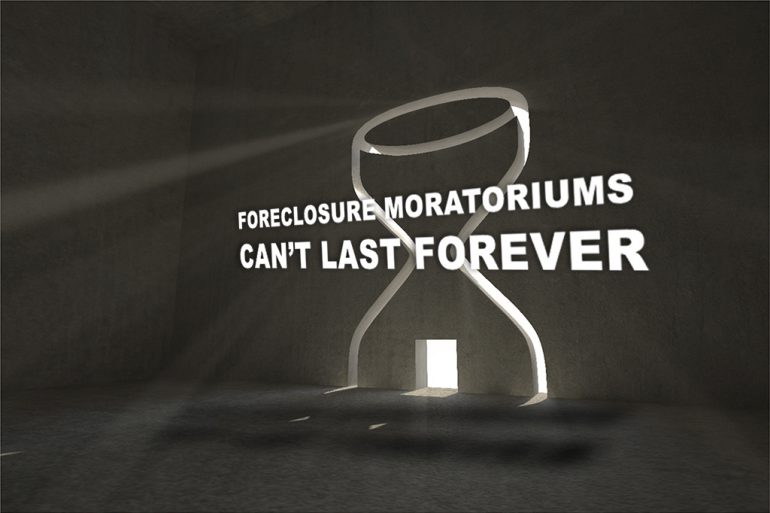Foreclosure & Eviction Moratoriums Can’t Last Forever, Here’s Why
Foreclosure Moratorium Can’t Last Forever: Here’s Why
The pandemic has changed real estate — it is now much harder to foreclose on properties when homeowners fall behind on their mortgages. At the peak of the pandemic crisis, the Mortgage Bankers Association noted that a whopping 8.55% (4.3 million) of all mortgages were in forbearance in June of 2020. Forbearance allowed homeowners to skip payments and tack on the missed payments to the end of the loan.
That percentage has steadily declined to a 12-month low of 4.5% this April. To put these numbers into context, during the Great Recession, the percent of mortgages that were behind on payments peaked at 11% and typically hovered between 9 and 10 percent.
After the federal moratorium expires, lenders can begin the process of foreclosure on the special situation they weren’t allowed to foreclose on before, namely federal-backed loans of homesteaded properties where the owners could demonstrate COVID-19 had financially impacted their ability to pay their mortgage.
The moratorium won’t last forever. It’s a matter of time until these homeowners have to catch up on missed payments or leave their properties.
Why Won’t the Moratorium Last?
The moratorium is a temporary measure to prevent waves of foreclosures during the pandemic. The longer it continues, the more harm it does to the real estate market.
The central components of real estate are ownership, rentals, loaning money for purchases/sales, and the rules governing the markets. A breakdown in any one of these areas can lead to catastrophic consequences for the real estate market.
Property Ownership
Ownership is based on the concepts of paying property taxes, a mortgage, maintenance bills, and other fees. If the moratorium continues forever, property owners will lose the incentive to buy, sell, or invest in real estate.
They will see decreases in value with no one meeting their obligations and move on to other areas where the rewards and transparency are more lucrative (such as stocks and bonds).
The real estate market is worth $36.2 trillion, and not holding people accountable for missing their payments causes sellers, buyers, and investors to rethink the concept of ownership. They realize that you can miss your payments and have no consequences for these actions. Many see these changes as a sign that there is no enforcement of regulations, laws, or standards.
Soon it will be more challenging to collect property taxes and HOA fees, and to perform essential maintenance. Confidence will erode, and many people who own properties will look for other investments that offer better returns and accountability. Investors will see no value in owning properties, renting them, or investing in a range of categories.
These shifts will cause the real estate market to suffer dramatically, creating a ripple effect across the economy.
Rentals
The longer the foreclosure moratorium continues, the more pressure it places on other property owners such as landlords. They are feeling the effects of the eviction moratorium that’s in place until June 30.
These owners invest in real estate to generate income and capital appreciation. The moment they think their anticipated returns will drop is the point when real estate loses its attractiveness.
If the moratorium continues, they will sell their properties and move into other asset classes where the income is more predictable. However, the end of the moratorium makes it possible for them to collect their back rent, have other tenants move into the property, and generate their projected income levels.
Lending for Purchases and Sales
Mortgages are the foundation of buying and selling real estate; without them, most people cannot afford to purchase homes.
The moratorium on foreclosures makes it difficult for banks to eliminate bad loans on their balance sheets. Instead, they have to carry these loans on their books and not remove them by seizing the property.
The longer the moratorium continues, the more damage it will do to financial institutions. Banks and mortgage companies realize declining profits with delinquent loans not paying their interest or principal. These actions cause financial institutions to face insolvency.
The longer the moratorium continues, the higher the odds of them facing significant challenges from the bad loans they are carrying. Ending it is the only way they can clear up these issues.
The Rules of Property Ownership Fall into Chaos
Anytime a property is sold, it is a legal contract between the buyer, seller, and financial institution. The buyer agrees to purchase the property for a specific amount stated in the contract. The seller provides them with legal title to the property, and the financial institution loans them the money for the purchase.
A continuation of the moratorium challenges the very heart of contracts by making it possible for the buyer not to follow the terms and conditions.
These situations create anarchy — financial institutions will have no confidence that buyers will uphold their obligations. They’ll be less likely to loan money in the future and will want more guarantees when financing real estate transactions (such as bigger down payments and collateral).
Homeownership levels will drop, and there will be a lack of trust that each party can meet their responsibilities. Things will be further complicated by financial institutions having no legal way to seek out a remedy, such as foreclosure proceedings. There will be no penalty for breaking the contract, and everyone will do what they want with no recourse for their actions.
However, the moratorium’s removal enforces the traditional standards and imposes penalties on those who fail to honor their contractual obligations.
The Moratorium Must End so the Real Estate Industry Can Survive
The foreclosure moratorium won’t last forever; it can destroy the real estate market if it continues indefinitely. It is a temporary measure to offer relief to homeowners hurt during the pandemic.
After it ends, they must catch up on all missed mortgage payments or face the possibility of losing their homes. The restoration of these provisions will bring normalcy to the real estate industry, helping investors, financial institutions, and homeowners alike get back to business.








